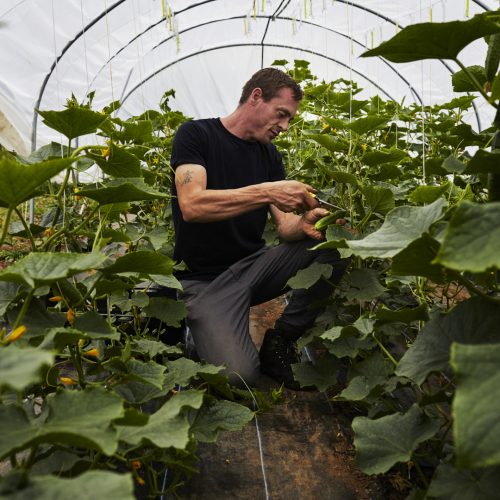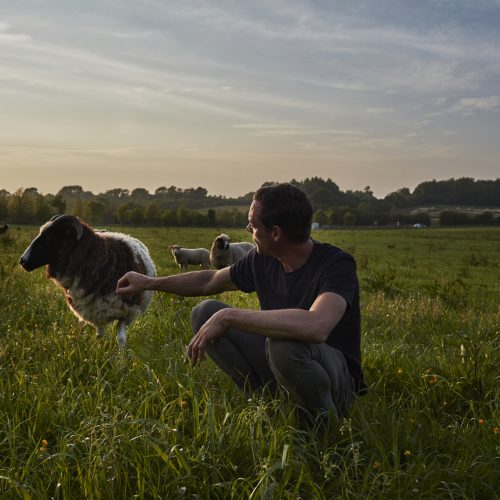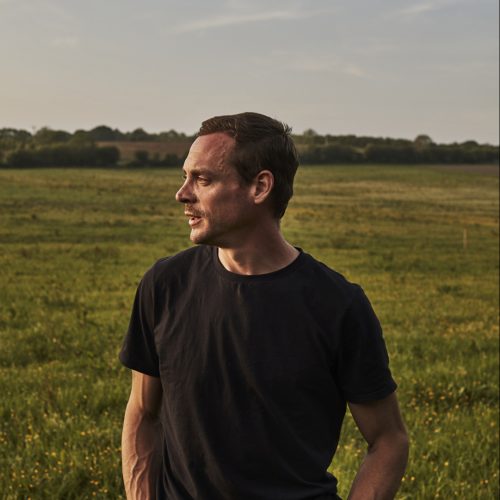2008
Dan Cox
“Winning the Roux Scholarship helps ignite the fire within you as you move forward, and you build on it.”
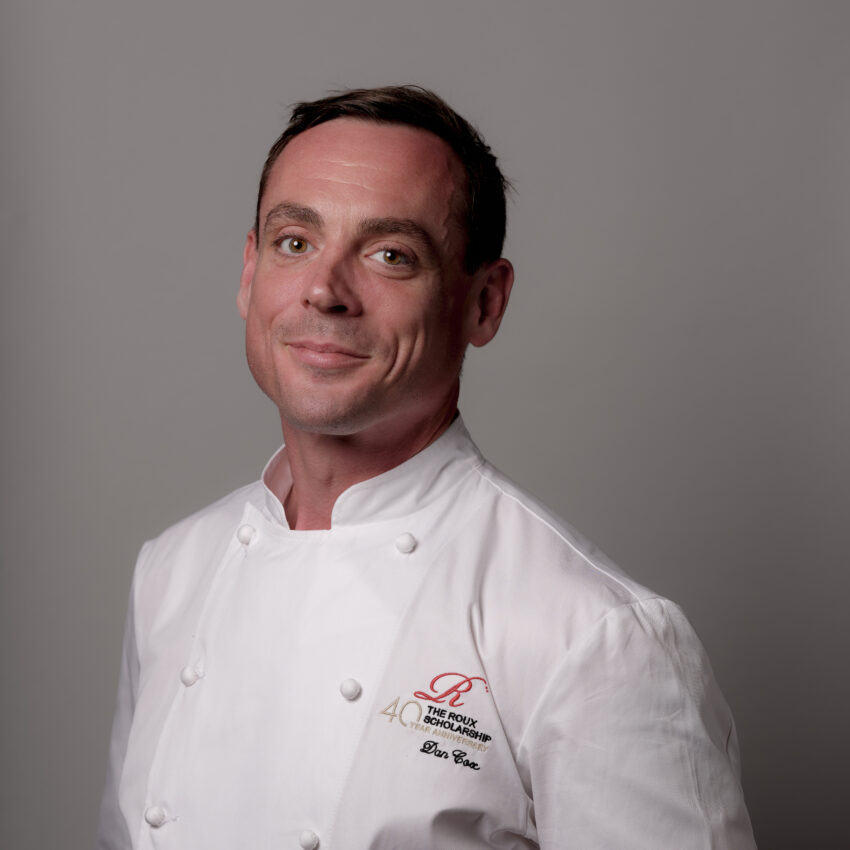
Dan won the Roux Scholarship in 2008 at the age of 26. It was his third time entering the competition. He did his stage at Santi Santamaria, Can Fabes, Barcelona. Dan is now running Crocadon Farm, St Mellion, Cornwall, as regenerative farmer and chef.
Dan grew up in London and decided to be a chef after being inspired by his grandmother when visiting during his holidays in Barry in Wales. He went on to do his training at Westminster Kingsway, while working as a commis chef at The Greenhouse in Mayfair. From there, Dan worked at several other restaurants in London before entering the world of contract catering, which was reaching for Michelin-star standard restaurants in such institutions as banks and management accountancy firms. This made it a good training ground for chefs with their eye on the Roux Scholarship.
After he injured his ankle in a motorbike accident, Dan needed a role that could be done while he recuperated and so he went to work for Roger Naylor, who had been a protégé of Albert Roux at Le Gavroche and was leading the brigade at Restaurant Associates' restaurant at Merrill Lynch. Naylor taught Dan to cook many classics from the Roux repertoire and encouraged him to enter the Roux Scholarship. At the time Dan was too young to enter, but after Naylor sadly died in 2003, Dan decided to make it his mission to win.
Fast forward to 2008, and Dan won the scholarship on his third try. He spent his stage at Can Fabes, in the mountains above Barcelona, which was the starting point for his passion for witnessing well-produced ingredients go from their origin to the plate and was fascinated by the care with which the ingredients were produced.
On returning to the UK, Dan was part of the team that launched Roux at Parliament Square. After a year, he returned to the mountains - having enjoyed the environment while on this stage - and took a role at a luxury hotel Number 14, in Verbier, Switzerland. Over the course of a year, he enjoyed the outdoorsy life as it changed through the seasons; perfect for snowboarding in the winter and foraging in the summer.
After meeting Simon Rogan at the Roux Scholarship awards ceremony in 2010, the two chefs kept in touch and became friends. After returning from Switzerland, Dan then went to work in Cumbria at the research kitchen restaurant Aulis, where he further developed his passion and interest in farm-to-plate methods, as well as working with Rogan to lead the development of the architecture of new restaurants such as the décor, crockery and menu design. He also ran the farm and was given freedom by Rogan to develop it as he saw fit, a role he adored.
When Rogan was offered the residency at Claridge’s Dan returned to London with him to open Fera, where Dan worked as executive chef for three successful years, with the restaurant winning a Michelin star within three months of opening.
In 2017, Dan set in motion his dream to establish an organic farm, with a restaurant, brewery and ceramics workshop that would work in complete harmony with the land. Inspired by the quality of produce he cooked while on his stage at Can Fabes and by the produce that came from Cornwall when he was working at Fera, Dan established the 120-acre site near St Mellion in Cornwall producing excellent quality regenerative organic vegetables and rare breed sheep. Dan has painstakingly restored the soil with cover crops and livestock, meanwhile he has built all the infrastructure from scratch, bringing in chefs, potters, woodworkers and volunteers to help bring his vision for a working farm to life. Dan's overarching goal is to supply chefs and home kitchens with traceable, nutrient-dense produce, and to prove that growing sustainably is a financially viable and scalable alternative to intensive farming. With the farm now established, the restaurant opened in February 2023 and was awarded a green sustainability star in the Michelin Guide 2023, and a Michelin star in 2024. .
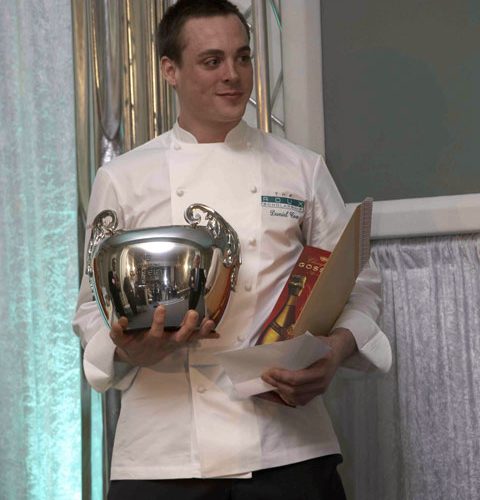
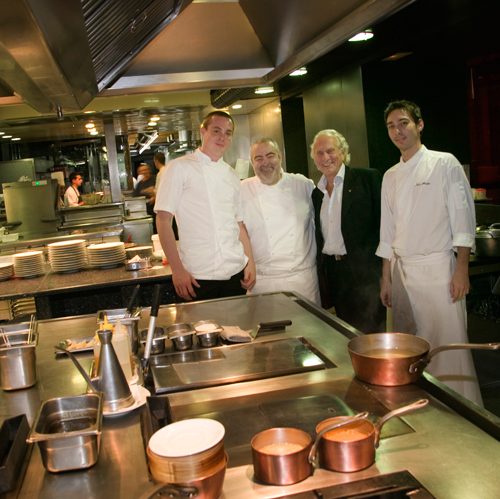
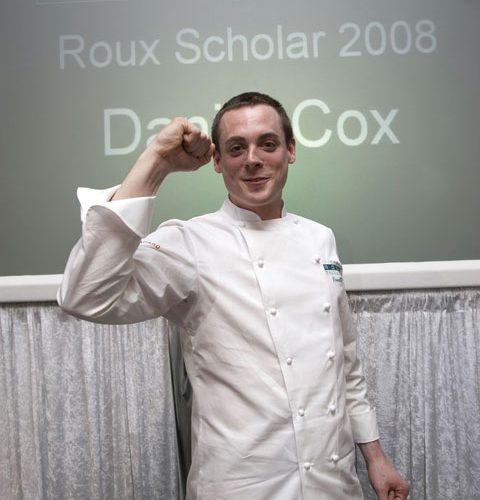
Where did you do your stage?
I really wanted to go to Spain and although El Bulli was making waves then, Albert and Michel felt that Can Fabes would be a good fit for me and my interest in following the produce from land to plate. Plus Santi Santamaria was the first chef in Catalunya to get three stars [he sadly died in 2013]. The restaurant was cool and interesting in its décor and everything, while his approach was quite modern all the way through, but it all came back to the product. Ask any Spanish chef and they’ll say he was a God in that sense; in the same way the Roux Brothers, they’re all legends. I had an incredible time, I was there in the mountains, between Barcelona and Girona, and I would go exploring, drive over the mountain to get to the beach.
How did the experience inspire you?
When you’ve seen the attention to detail they give to produce in Spain, where you’ve got the vegetables directly from the market and seen the fish land at the port and go through the auction straight away still with rigor mortis, and once you’ve cooked those ingredients, you don’t want to do it any other way. There are lots of different labels now, but what I see now is how the soil works, and what you need to do to make the system incredibly healthy. Cooking is one thing but if you’re cooking with stuff that contains low levels of poison, you’re not doing the right thing.
What did you cook in the final?
I cooked Rouen of duck leg with a pinot noir brandy sauce; I’d worked with duck before, but this was really hard because we had to cook the duck whole, or keep the duck whole; and then when the breasts were ready, take them off, then continue to cook the leg, then press the body and use the juices in the sauce. I noticed some of the other chefs immediately separated the breasts before cooking them, but the key thing was to cook it whole. There was also a gnocchi dish, and a pea garnish; all the ingredients were there for petit pois à la Français, and you could make that or do something of your choice, which I did. Afterwards, Andrew Fairlie pulled me to one side and said I did a really good job because my attention to detail was excellent. I do remember being absolutely meticulous about everything.
How many times did you enter?
I don’t think I was ready to win the first two times; that’s the thing about the Scholarship, some people win first time, off the bat; but you just ‘get it’ a bit more after the first time, you see what the judges are actually after and there’s a lot of luck involved. In the regionals some things just work, like the mystery box dessert, and some things don’t. It’s not just a straight competition, it’s a learning opportunity in itself: doing the competition gives you the ability to do better in the competition too. Also, interacting with the judges and them knowing you were there last year, it helps you learn. You can make errors on the day, just nothing major.
What do you remember most about the competition the year you won?
For that year, the final and the awards ceremony weren’t on the same day because the Mandarin Oriental was already booked, so we had the final at Westminster Kingsway and the result was announced at the ceremony three weeks later. In the time in between, the finalists had a butchery masterclass, which was like a mini competition in itself, and I won it – I trained a butcher before trained as a chef. Then at the ceremony at the Mandarin Oriental, I won the scholarship too.
What advice would you give applicants?
The main thing for me, is to make sure you start working on your dish as soon as the ingredients are announced at the launch of that year’s competition. The paper entry needs to be the result of all your work on creating your dish. Lots of people start with writing the recipe, but it should be the other way around, you’re just recording your work on the dish with what you write.
Who are your culinary heroes?
Albert Roux: when I went to work for Roger Naylor, who could really cook, he always talked about Albert, he was always his vision, and was always the one you focused on and was head of the family, he’s the ultimate legend in the UK, and he has this totally charming charisma. Also my grandmother, she used to watch the Roux Brothers' programmes. She’s the one who taught me to cook; she passed away aged 98 in 2019.
What is it like to be a Roux Scholar?
I think it gives you a confidence and a belief in yourself that you don’t get anywhere else. Seeing someone like Sat Bains, who took that restaurant on and completely made it his own, is a big inspiration. You can see what the Roux Scholarship did for his situation.
Tell us about your career highlights?
Winning the Roux Scholarship feels like an ongoing highlight – it helps ignite the fire within you as you move forward, and you build on it. In society in the past, class was everything, but now you can lift yourself up to the next level, everyone respects it, you work so hard to get there and you prove your worth against your peers and the judges, who are legends. It’s very progressive and inclusive and that’s the circular vision that Michel and Albert had, that’s what makes it different. I always found competitions stressful, but I loved to cook and never thought I’d want the extra pressure of a competition, but the judges were so kind. When I competed, Heston [Blumenthal] was a judge and he was so gentle and really inquisitive; he said: ‘We’re here to help you, if you struggle, we’ll find a solution.’
